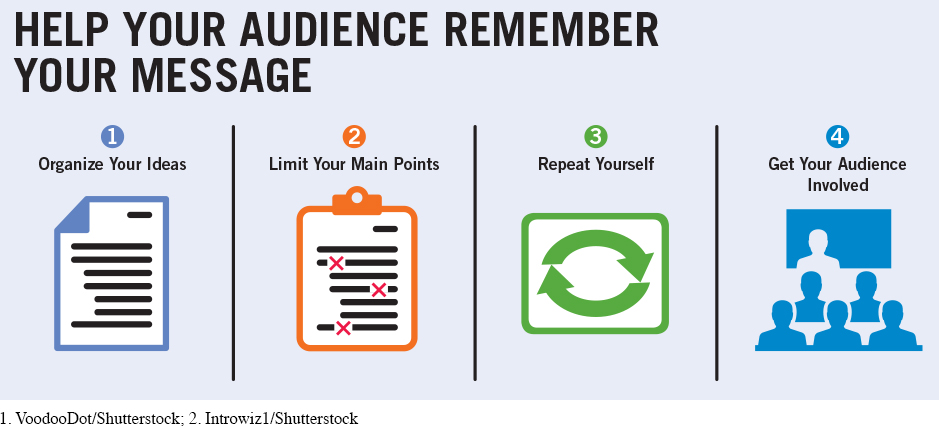Help Your Audience Remember Your Message
One measure of an informative speech’s success is whether your listeners remember it. A lot of things can interfere with an audience’s ability to pay attention to—
 LearningCurve can help you review! Go to macmillanhighered.com/
LearningCurve can help you review! Go to macmillanhighered.com/
Organize your ideas. When you show listeners how ideas go together, they’ll be more likely to remember them. Consider this group of letters: PBSCBSESPNNBC. If you were to read these out loud to an audience, your listeners would find it difficult to remember them. But if you organized the letters into groupings that made sense to your audience—
PBS, CBS, ESPN, NBC— the letters would become meaningful, and listeners would more easily retain them. Using connectives (First, Next) in your speech can further help your audience see how your main points are related. Limit your main points. As Chapter 14 discusses, main points are the key statements or principles that support the speech thesis (see pp. 349–
355). As you prepare your informative speech, try to limit your main points to between three and five. Too many more, and the audience (and you!) might have trouble following and remembering your line of thinking. Repeat yourself. Repeating information helps people retain it. While studying for a test, you probably go over the information several times to commit it to memory. Help your audience remember your main ideas by using the same basic principle of repetition. However, don’t just say the same words over and over. Instead, illustrate a main point through different means. For instance, you can use a preview statement to introduce the point, increase the volume of your voice when explaining the point, reinforce the point through a visual aid, and then remind the audience of the point in your summary statement.
Get your audience involved. People tend to remember things that they participate in. Think about your college classes. Which ones do you remember the most—
the classes in which the teacher lectured in a monotone, or those that had lots of discussion and group work? Even with a large group, it’s possible to still involve your audience. Nelson Dellis managed to get his listeners involved by asking them to recall the words and phrases after their journey story. To involve your listeners during an informative speech, ask for a volunteer to take part in a simple demonstration, or have listeners answer a simple question. These kinds of positive disruptions break up your speech and help your audience pay closer attention to your point— which makes it more likely that they’ll remember your message.

To see how the principles and guidelines of informative speeches can come together, look over the transcript for the speech “Social Media, Social Identity, and Social Causes” by Anna Davis on pages 426–